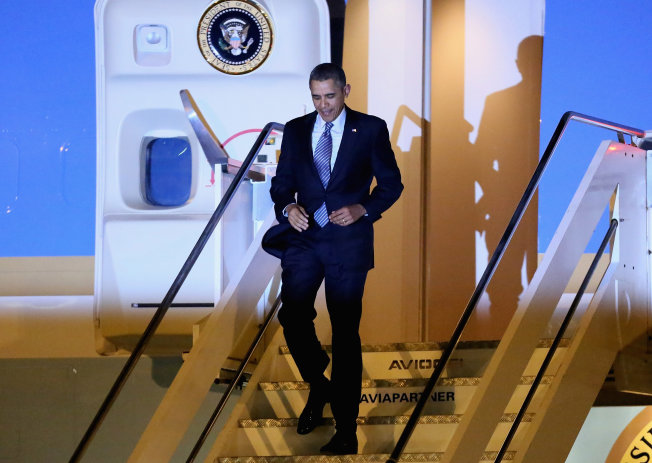President Obama, Pope Francis to Meet for First Time
The world’s most powerful political leader and the world’s most powerful religious leader will meet for the first time Today,when President Barack Obama visits Pope Francis at the Vatican.
Mar 27, 2014

VATICAN: The world’s most powerful political leader and the world’s most powerful religious leader will meet for the first time Today, when President Barack Obama visits Pope Francis at the Vatican. Francis, who was elected pope a little more than a year ago, has captured world headlines by turning the Roman Catholic Church’s focus back to serving the disadvantaged and away from issues like abortion and gay marriage, and by taking action to address church corruption.
Obama has been public about his respect for the pope, particularly admiring the faith leader’s focus on social justice. Even though the president is not Catholic, Joshua DuBois – the former director of the White House Office of Faith-based and Neighborhood Partnerships – says Obama began his community organizing career in a role with the Catholic Church. “Really from his earliest days it’s been a connection with the Catholic Church and an awareness of Catholic social teaching,” DuBois says.
The first African-American U.S. president and the first Latin American pope share similar views on social issues like income inequality and immigration. “A good deal of the economic agenda of President Obama and of the Democratic Party is consonant with Catholic social teaching,” says the Rev. Paul Sullins, a professor of sociology at The Catholic University of America.
Obama “has very much admired the leadership” of Francis, White House Deputy National Security Adviser Ben Rhodes said. The leaders should have a cordial encounter, Sullins says, and because the meeting is a “diplomatic call,” they are unlikely to dwell on issues about which they disagree.
Indeed, while the left has embraced Francis, he still disagrees with most Democrats on several important issues. Francis shocked the world last year with his comments about gay priests – “If someone is gay and he searches for the Lord and has good will, who am I to judge?” – but homosexuality still is considered a sin in the Catholic Church. The Vatican was quick to clarify that the pope was not suggesting gay priests act upon their homosexual tendencies, but Francis’ remarks nonetheless represented a notable pivot away from the anti-gay attitude of his predecessor, Pope Benedict XVI.
Conversely, Obama supports gay marriage as well as access to abortion and contraception. Church teaching rejects any method of preventing pregnancy, and despite his desire to move the Catholic agenda away from its heavy focus on abortion, Francis condemns it. “In all its phases and at every age, human life is always sacred and always of quality,” Francis said last September. “And not as a matter of faith, but of reason and science!”
“I think it’s no surprise that there are going to be some areas of potential disagreement,” DuBois says. “The helpful thing is that these are two leaders who don’t let areas of disagreement stop them from finding points of collaboration, so I think they will likely acknowledge the disagreements they may have but then move on to find areas of common ground.”
DuBois says the two men are also likely to discuss a host of world issues, including Middle East peace and the unfolding situation involving Russia and Ukraine.
Obama traveled to the Vatican to meet Benedict in 2009, and said at the National Prayer Breakfast last month he was looking forward to returning to meet Francis. “[H]e inspires us with his words and deeds, his humility, his mercy and his missionary impulse to serve the cause of social justice,” Obama said.
Francis has eschewed the luxury normally associated with his office, choosing to live in a modest guesthouse at the Vatican rather than the papal apartments, and frequently traveling by humble means. That humbleness has been a mark of Francis’ one year in office, and he has galvanized many of the world’s 1.2 billion Catholics while rejecting the view of himself as a “superpope.”
“He’s been just a wonderful breath of fresh air to American Catholics,” Sullins says of Francis. “He has inspired many people to come back to the church and take a second look at the church, and encouraged those within the church to feel better about the church.”
Yet despite the palpable enthusiasm for Francis, a survey by the Pew Research Center suggests the “Francis effect” is having little tangible impact on American Catholics returning to the faith or practicing it regularly by going to Mass. Self-reported weekly Mass attendance was at 40 percent both before and after election of the new pope, even with the pope’s favorability rating among Catholics at 85 percent.
Seventy-one percent of U.S. Catholics said Francis marks a “major change of direction for the Catholic Church” – 68 percent of those respondents said the change was for the better.--usnews.com







Total Comments:0